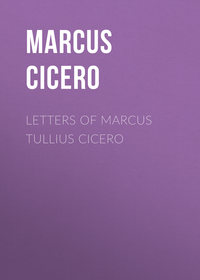 полная версия
полная версияCicero's Tusculan Disputations
XXIII. “That which is always moved is eternal; but that which gives motion to something else, and is moved itself by some external cause, when that motion ceases, must necessarily cease to exist. That, therefore, alone, which is self-moved, because it is never forsaken by itself, can never cease to be moved. Besides, it is the beginning and principle of motion to everything else; but whatever is a principle has no beginning, for all things arise from that principle, and it cannot itself owe its rise to anything else; for then it would not be a principle did it proceed from anything else. But if it has no beginning, it never will have any end; for a principle which is once extinguished cannot itself be restored by anything else, nor can it produce anything else from itself; inasmuch as all things must necessarily arise from some first cause. And thus it comes about that the first principle of motion must arise from that thing which is itself moved by itself; and that can neither have a beginning nor an end of its existence, for otherwise the whole heaven and earth would be overset, and all nature would stand still, and not be able to acquire any force by the impulse of which it might be first set in motion. Seeing, then, that it is clear that whatever moves itself is eternal, can there be any doubt that the soul is so? For everything is inanimate which is moved by an external force; but everything which is animate is moved by an interior force, which also belongs to itself. For this is the peculiar nature and power of the soul; and if the soul be the only thing in the whole world which has the power of self-motion, then certainly it never had a beginning, and therefore it is eternal.”
Now, should all the lower order of philosophers (for so I think they may be called who dissent from Plato and Socrates and that school) unite their force, they never would be able to explain anything so elegantly as this, nor even to understand how ingeniously this conclusion is drawn. The soul, then, perceives itself to have motion, 33and at the same time that it gets that perception, it is sensible that it derives that motion from its own power, and not from the agency of another; and it is impossible that it should ever forsake itself. And these premises compel you to allow its eternity, unless you have something to say against them.
A. I should myself be very well pleased not to have even a thought arise in my mind against them, so much am I inclined to that opinion.
XXIV. M. Well, then, I appeal to you, if the arguments which prove that there is something divine in the souls of men are not equally strong? But if I could account for the origin of these divine properties, then I might also be able to explain how they might cease to exist; for I think I can account for the manner in which the blood, and bile, and phlegm, and bones, and nerves, and veins, and all the limbs, and the shape of the whole body, were put together and made; ay, and even as to the soul itself, were there nothing more in it than a principle of life, then the life of a man might be put upon the same footing as that of a vine or any other tree, and accounted for as caused by nature; for these things, as we say, live. Besides, if desires and aversions were all that belonged to the soul, it would have them only in common with the beasts; but it has, in the first place, memory, and that, too, so infinite as to recollect an absolute countless number of circumstances, which Plato will have to be a recollection of a former life; for in that book which is inscribed Menon, Socrates asks a child some questions in geometry, with reference to measuring a square; his answers are such as a child would make, and yet the questions are so easy, that while answering them, one by one, he comes to the same point as if he had learned geometry. From whence Socrates would infer that learning is nothing more than recollection; and this topic he explains more accurately in the discourse which he held the very day he died; for he there asserts that, any one, who seeming to be entirely illiterate, is yet able to answer a question well that is proposed to him, does in so doing manifestly show that he is not learning it then, but recollecting it by his memory. Nor is it to be accounted for in any other way, how children 34come to have notions of so many and such important things as are implanted, and, as it were, sealed up, in their minds (which the Greeks call ἔννοιαι), unless the soul, before it entered the body, had been well stored with knowledge. And as it had no existence at all (for this is the invariable doctrine of Plato, who will not admit anything to have a real existence which has a beginning and an end, and who thinks that that alone does really exist which is of such a character as what he calls εἴδεα, and we species), therefore, being shut up in the body, it could not while in the body discover what it knows; but it knew it before, and brought the knowledge with it, so that we are no longer surprised at its extensive and multifarious knowledge. Nor does the soul clearly discover its ideas at its first resort to this abode to which it is so unaccustomed, and which is in so disturbed a state; but after having refreshed and recollected itself, it then by its memory recovers them; and, therefore, to learn implies nothing more than to recollect. But I am in a particular manner surprised at memory. For what is that faculty by which we remember? what is its force? what its nature? I am not inquiring how great a memory Simonides13 may be said to have had, or Theodectes,14 or that Cineas15 who was sent to Rome as ambassador from Pyrrhus; or, in more modern times, Charmadas;16 or, very lately, Metrodorus17 35the Scepsian, or our own contemporary Hortensius18: I am speaking of ordinary memory, and especially of those men who are employed in any important study or art, the great capacity of whose minds it is hard to estimate, such numbers of things do they remember.
XXV. Should you ask what this leads to, I think we may understand what that power is, and whence we have it. It certainly proceeds neither from the heart, nor from the blood, nor from the brain, nor from atoms; whether it be air or fire, I know not, nor am I, as those men are, ashamed, in cases where I am ignorant, to own that I am so. If in any other obscure matter I were able to assert anything positively, then I would swear that the soul, be it air or fire, is divine. Just think, I beseech you: can you imagine this wonderful power of memory to be sown in or to be a part of the composition of the earth, or of this dark and gloomy atmosphere? Though you cannot apprehend what it is, yet you see what kind of thing it is, or if you do not quite see that, yet you certainly see how great it is. What, then? Shall we imagine that there is a kind of measure in the soul, into which, as into a vessel, all that we remember is poured? That indeed is absurd; for how shall we form any idea of the bottom, or of the shape or fashion of such a soul as that? And, again, how are we to conceive how much it is able to contain? Shall we imagine the soul to receive impressions like wax, and memory to be marks of the impressions made on the soul? What are the characters of the words, what of the facts themselves? and what, again, is that prodigious greatness which can give rise to impressions of so many things? What, lastly, is that power which investigates secret things, and is called invention and contrivance? Does that man seem to be compounded of this earthly, mortal, and perishing nature who first invented names for everything; 36which, if you will believe Pythagoras, is the highest pitch of wisdom? or he who collected the dispersed inhabitants of the world, and united them in the bonds of social life? or he who confined the sounds of the voice, which used to seem infinite, to the marks of a few letters? or he who first observed the courses of the planets, their progressive motions, their laws? These were all great men. But they were greater still who invented food, and raiment, and houses; who introduced civilization among us, and armed us against the wild beasts; by whom we were made sociable and polished, and so proceeded from the necessaries of life to its embellishments. For we have provided great entertainments for the ears by inventing and modulating the variety and nature of sounds; we have learned to survey the stars, not only those that are fixed, but also those which are improperly called wandering; and the man who has acquainted himself with all their revolutions and motions is fairly considered to have a soul resembling the soul of that Being who has created those stars in the heavens: for when Archimedes described in a sphere the motions of the moon, sun, and five planets, he did the very same thing as Plato’s God, in his Timæus, who made the world, causing one revolution to adjust motions differing as much as possible in their slowness and velocity. Now, allowing that what we see in the world could not be effected without a God, Archimedes could not have imitated the same motions in his sphere without a divine soul.
XXVI. To me, indeed, it appears that even those studies which are more common and in greater esteem are not without some divine energy: so that I do not consider that a poet can produce a serious and sublime poem without some divine impulse working on his mind; nor do I think that eloquence, abounding with sonorous words and fruitful sentences, can flow thus without something beyond mere human power. But as to philosophy, that is the parent of all the arts: what can we call that but, as Plato says, a gift, or, as I express it, an invention, of the Gods? This it was which first taught us the worship of the Gods; and then led us on to justice, which arises from the human race being formed into society; and after that 37it imbued us with modesty and elevation of soul. This it was which dispersed darkness from our souls, as it is dispelled from our eyes, enabling us to see all things that are above or below, the beginning, end, and middle of everything. I am convinced entirely that that which could effect so many and such great things must be a divine power. For what is memory of words and circumstances? What, too, is invention? Surely they are things than which nothing greater can be conceived in a God! For I do not imagine the Gods to be delighted with nectar and ambrosia, or with Juventas presenting them with a cup; nor do I put any faith in Homer, who says that Ganymede was carried away by the Gods on account of his beauty, in order to give Jupiter his wine. Too weak reasons for doing Laomedon such injury! These were mere inventions of Homer, who gave his Gods the imperfections of men. I would rather that he had given men the perfections of the Gods! those perfections, I mean, of uninterrupted health, wisdom, invention, memory. Therefore the soul (which is, as I say, divine) is, as Euripides more boldly expresses it, a God. And thus, if the divinity be air or fire, the soul of man is the same; for as that celestial nature has nothing earthly or humid about it, in like manner the soul of man is also free from both these qualities: but if it is of that fifth kind of nature, first introduced by Aristotle, then both Gods and souls are of the same.
XXVII. As this is my opinion, I have explained it in these very words, in my book on Consolation.19 The origin of the soul of man is not to be found upon earth, for there is nothing in the soul of a mixed or concrete nature, or that has any appearance of being formed or made out of the earth; nothing even humid, or airy, or fiery. For what is there in natures of that kind which has the power of memory, understanding, or thought? which can recollect the past, foresee the future, and comprehend the present? for these capabilities are confined to divine beings; nor can we discover any source from which men could derive them, but from God. There is therefore a peculiar 38nature and power in the soul, distinct from those natures which are more known and familiar to us. Whatever, then, that is which thinks, and which has understanding, and volition, and a principle of life, is heavenly and divine, and on that account must necessarily be eternal; nor can God himself, who is known to us, be conceived to be anything else except a soul free and unembarrassed, distinct from all mortal concretion, acquainted with everything, and giving motion to everything, and itself endued with perpetual motion.
XXVIII. Of this kind and nature is the intellect of man. Where, then, is this intellect seated, and of what character is it? where is your own, and what is its character? Are you able to tell? If I have not faculties for knowing all that I could desire to know, will you not even allow me to make use of those which I have? The soul has not sufficient capacity to comprehend itself; yet, the soul, like the eye, though it has no distinct view of itself, sees other things: it does not see (which is of least consequence) its own shape; perhaps not, though it possibly may; but we will pass that by: but it certainly sees that it has vigor, sagacity, memory, motion, and velocity; these are all great, divine, eternal properties. What its appearance is, or where it dwells, it is not necessary even to inquire. As when we behold, first of all, the beauty and brilliant appearance of the heavens; secondly, the vast velocity of its revolutions, beyond power of our imagination to conceive; then the vicissitudes of nights and days, the fourfold division of the seasons, so well adapted to the ripening of the fruits of the earth, and the temperature of our bodies: and after that we look up to the sun, the moderator and governor of all these things; and view the moon, by the increase and decrease of its light, marking, as it were, and appointing our holy days; and see the five planets, borne on in the same circle, divided into twelve parts, preserving the same course with the greatest regularity, but with utterly dissimilar motions among themselves; and the nightly appearance of the heaven, adorned on all sides with stars; then, the globe of the earth, raised above the sea, and placed in the centre of the universe, inhabited and cultivated in its two opposite extremities, one of which, the 39place of our habitation, is situated towards the north pole, under the seven stars:
Where the cold northern blasts, with horrid sound,Harden to ice the snowy cover’d ground;the other, towards the south pole, is unknown to us, but is called by the Greeks ἀντίχθονα: the other parts are uncultivated, because they are either frozen with cold, or burned up with heat; but where we dwell, it never fails, in its season,
To yield a placid sky, to bid the treesAssume the lively verdure of their leaves:The vine to bud, and, joyful, in its shoots,Foretell the approaching vintage of its fruits:The ripen’d corn to sing, while all aroundFull riv’lets glide; and flowers deck the ground:then the multitude of cattle, fit part for food, part for tilling the ground, others for carrying us, or for clothing us; and man himself, made, as it were, on purpose to contemplate the heavens and the Gods, and to pay adoration to them: lastly, the whole earth, and wide extending seas, given to man’s use. When we view these and numberless other things, can we doubt that they have some being who presides over them, or has made them (if, indeed, they have been made, as is the opinion of Plato, or if, as Aristotle thinks, they are eternal), or who at all events is the regulator of so immense a fabric and so great a blessing to men? Thus, though you see not the soul of man, as you see not the Deity, yet, as by the contemplation of his works you are led to acknowledge a God, so you must own the divine power of the soul, from its remembering things, from its invention, from the quickness of its motion, and from all the beauty of virtue. Where, then, is it seated, you will say?
XXIX. In my opinion, it is seated in the head, and I can bring you reasons for my adopting that opinion. At present, let the soul reside where it will, you certainly have one in you. Should you ask what its nature is? It has one peculiarly its own; but admitting it to consist of fire, or air, it does not affect the present question. Only observe this, that as you are convinced there is a God, though 40you are ignorant where he resides, and what shape he is of; in like manner you ought to feel assured that you have a soul, though you cannot satisfy yourself of the place of its residence, nor its form. In our knowledge of the soul, unless we are grossly ignorant of natural philosophy, we cannot but be satisfied that it has nothing but what is simple, unmixed, uncompounded, and single; and if this is admitted, then it cannot be separated, nor divided, nor dispersed, nor parted, and therefore it cannot perish; for to perish implies a parting-asunder, a division, a disunion, of those parts which, while it subsisted, were held together by some band. And it was because he was influenced by these and similar reasons that Socrates neither looked out for anybody to plead for him when he was accused, nor begged any favor from his judges, but maintained a manly freedom, which was the effect not of pride, but of the true greatness of his soul; and on the last day of his life he held a long discourse on this subject; and a few days before, when he might have been easily freed from his confinement, he refused to be so; and when he had almost actually hold of that deadly cup, he spoke with the air of a man not forced to die, but ascending into heaven.
XXX. For so indeed he thought himself, and thus he spoke: “That there were two ways, and that the souls of men, at their departure from the body, took different roads; for those which were polluted with vices that are common to men, and which had given themselves up entirely to unclean desires, and had become so blinded by them as to have habituated themselves to all manner of debauchery and profligacy, or to have laid detestable schemes for the ruin of their country, took a road wide of that which led to the assembly of the Gods; but they who had preserved themselves upright and chaste, and free from the slightest contagion of the body, and had always kept themselves as far as possible at a distance from it, and while on earth had proposed to themselves as a model the life of the Gods, found the return to those beings from whom they had come an easy one.” Therefore, he argues, that all good and wise men should take example from the swans, who are considered sacred to Apollo, not without reason, but particularly because they seem to have received 41the gift of divination from him, by which, foreseeing how happy it is to die, they leave this world with singing and joy. Nor can any one doubt of this, unless it happens to us who think with care and anxiety about the soul (as is often the case with those who look earnestly at the setting sun), to lose the sight of it entirely; and so the mind’s eye, viewing itself, sometimes grows dull, and for that reason we become remiss in our contemplation. Thus our reasoning is borne about, harassed with doubts and anxieties, not knowing how to proceed, but measuring back again those dangerous tracts which it has passed, like a boat tossed about on the boundless ocean. But these reflections are of long standing, and borrowed from the Greeks. But Cato left this world in such a manner as if he were delighted that he had found an opportunity of dying; for that God who presides in us forbids our departure hence without his leave. But when God himself has given us a just cause, as formerly he did to Socrates, and lately to Cato, and often to many others—in such a case, certainly every man of sense would gladly exchange this darkness for that light: not that he would forcibly break from the chains that held him, for that would be against the law; but, like a man released from prison by a magistrate or some lawful authority, so he too would walk away, being released and discharged by God. For the whole life of a philosopher is, as the same philosopher says, a meditation on death.
XXXI. For what else is it that we do, when we call off our minds from pleasure, that is to say, from our attention to the body, from the managing our domestic estate, which is a sort of handmaid and servant of the body, or from duties of a public nature, or from all other serious business whatever? What else is it, I say, that we do, but invite the soul to reflect on itself? oblige it to converse with itself, and, as far as possible, break off its acquaintance with the body? Now, to separate the soul from the body, is to learn to die, and nothing else whatever. Wherefore take my advice; and let us meditate on this, and separate ourselves as far as possible from the body, that is to say, let us accustom ourselves to die. This will be enjoying a life like that of heaven even while we remain on earth; and 42when we are carried thither and released from these bonds, our souls will make their progress with more rapidity; for the spirit which has always been fettered by the bonds of the body, even when it is disengaged, advances more slowly, just as those do who have worn actual fetters for many years: but when we have arrived at this emancipation from the bonds of the body, then indeed we shall begin to live, for this present life is really death, which I could say a good deal in lamentation for if I chose.
A. You have lamented it sufficiently in your book on Consolation; and when I read that, there is nothing which I desire more than to leave these things; but that desire is increased a great deal by what I have just heard.
M. The time will come, and that soon, and with equal certainty, whether you hang back or press forward; for time flies. But death is so far from being an evil, as it lately appeared to you, that I am inclined to suspect, not that there is no other thing which is an evil to man, but rather that there is nothing else which is a real good to him; if, at least, it is true that we become thereby either Gods ourselves, or companions of the Gods. However, this is not of so much consequence, as there are some of us here who will not allow this. But I will not leave off discussing this point till I have convinced you that death can, upon no consideration whatever, be an evil.
A. How can it, after what I now know?
M. Do you ask how it can? There are crowds of arguers who contradict this; and those not only Epicureans, whom I regard very little, but, somehow or other, almost every man of letters; and, above all, my favorite Dicæarchus is very strenuous in opposing the immortality of the soul: for he has written three books, which are entitled Lesbiacs, because the discourse was held at Mitylene, in which he seeks to prove that souls are mortal. The Stoics, on the other hand, allow us as long a time for enjoyment as the life of a raven; they allow the soul to exist a great while, but are against its eternity.
XXXII. Are you willing to hear then why, even allowing this, death cannot be an evil.
A. As you please; but no one shall drive me from my belief in mortality.
43M. I commend you, indeed, for that; though we should not be too confident in our belief of anything; for we are frequently disturbed by some subtle conclusion. We give way and change our opinions even in things that are more evident than this; for in this there certainly is some obscurity. Therefore, should anything of this kind happen, it is well to be on our guard.
A. You are right in that; but I will provide against any accident.
M. Have you any objection to our dismissing our friends the Stoics—those, I mean, who allow that the souls exist after they have left the body, but yet deny that they exist forever?
A. We certainly may dismiss the consideration of those men who admit that which is the most difficult point in the whole question, namely, that a soul can exist independently of the body, and yet refuse to grant that which is not only very easy to believe, but which is even the natural consequence of the concession which they have made—that if they can exist for a length of time; they most likely do so forever.
M. You take it right; that is the very thing. Shall we give, therefore, any credit to Pauæstius, when he dissents from his master, Plato? whom he everywhere calls divine, the wisest, the holiest of men, the Homer of philosophers, and whom he opposes in nothing except this single opinion of the soul’s immortality: for he maintains what nobody denies, that everything which has been generated will perish, and that even souls are generated, which he thinks appears from their resemblance to those of the men who begot them; for that likeness is as apparent in the turn of their minds as in their bodies. But he brings another reason—that there is nothing which is sensible of pain which is not also liable to disease; but whatever is liable to disease must be liable to death. The soul is sensible of pain, therefore it is liable to perish.









